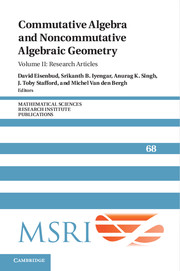Book contents
- Frontmatter
- Contents
- Preface
- When is a squarefree monomial ideal of linear type?
- Modules for elementary abelian groups and hypersurface singularities
- Ideals generated by superstandard tableaux
- Zariski topologies on stratified spectra of quantum algebras
- The derived category of a graded Gorenstein ring
- Singularities with respect to Mather–Jacobian discrepancies
- Reduction numbers and balanced ideals
- Unipotent and Nakayama automorphisms of quantum nilpotent algebras
- Formal fibers of prime ideals in polynomial rings
- Bounding the socles of powers of squarefree monomial ideals
- An intriguing ring structure on the set of d-forms
- On the subadditivity problem for maximal shifts in free resolutions
- The cone of Betti tables over a rational normal curve
- Adjoint associativity: an invitation to algebra in ∞-categories
When is a squarefree monomial ideal of linear type?
Published online by Cambridge University Press: 29 May 2025
- Frontmatter
- Contents
- Preface
- When is a squarefree monomial ideal of linear type?
- Modules for elementary abelian groups and hypersurface singularities
- Ideals generated by superstandard tableaux
- Zariski topologies on stratified spectra of quantum algebras
- The derived category of a graded Gorenstein ring
- Singularities with respect to Mather–Jacobian discrepancies
- Reduction numbers and balanced ideals
- Unipotent and Nakayama automorphisms of quantum nilpotent algebras
- Formal fibers of prime ideals in polynomial rings
- Bounding the socles of powers of squarefree monomial ideals
- An intriguing ring structure on the set of d-forms
- On the subadditivity problem for maximal shifts in free resolutions
- The cone of Betti tables over a rational normal curve
- Adjoint associativity: an invitation to algebra in ∞-categories
Summary
In 1995 Villarreal gave a combinatorial description of the equations of Rees algebras of quadratic squarefree monomial ideals. His description was based on the concept of closed even walks in a graph. In this paper we will generalize his results to all squarefree monomial ideals by defining even walks in a simplicial complex. We show that simplicial complexes with no even walks have facet ideals that are of linear type, generalizing Villarreal’s work.
Rees algebras are of special interest in algebraic geometry and commutative algebra since they describe the blowing up of the spectrum of a ring along the subscheme defined by an ideal. The Rees algebra of an ideal can also be viewed as a quotient of a polynomial ring. If I is an ideal of a ring R, we denote the Rees algebra of I by R[I t], and we can represent R[I t] as S/J where S is a polynomial ring over R. The ideal J is called the defining ideal of R[I t]. Finding generators of J is difficult and crucial for better understanding R[I t]. Many authors have worked to gain better insight into these generators in special classes of ideals, such as those with special height, special embedding dimension and so on.
Information
- Type
- Chapter
- Information
- Commutative Algebra and Noncommutative Algebraic GeometryVolume 2: Research Articles, pp. 1 - 18Publisher: Cambridge University PressPrint publication year: 2015
